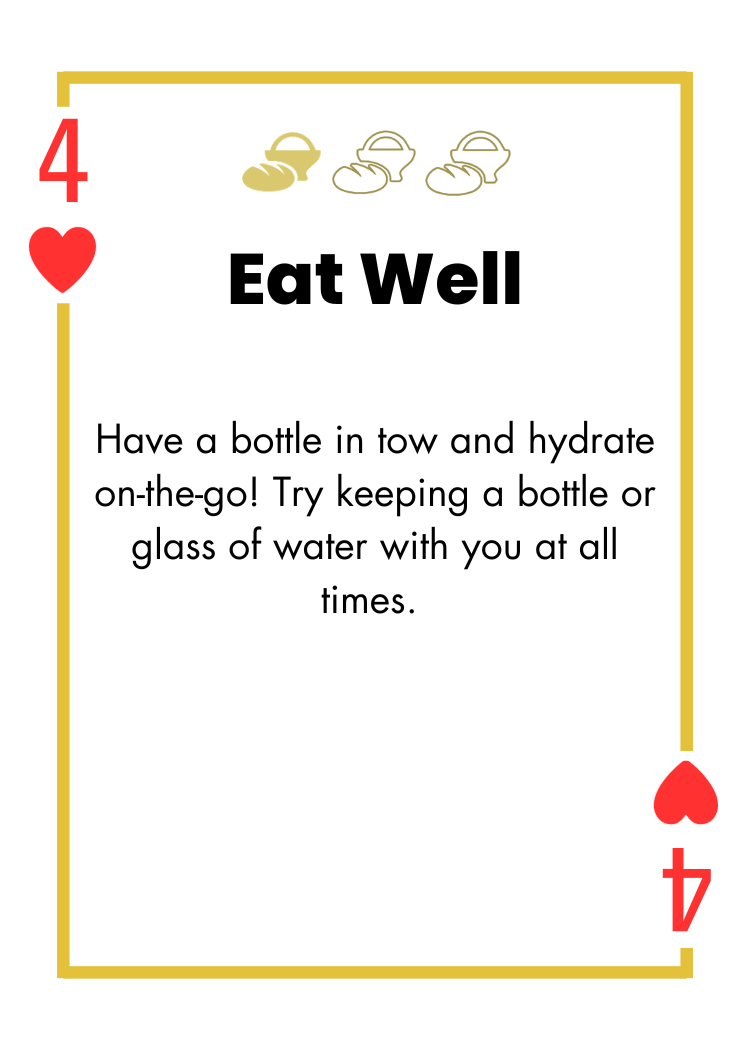4 of Hearts - Water on the Go!

This tip seems easy enough, right?
However, most people do not drink enough water and proper hydration is super important for both physical and mental fitness. Too little water can affect your mental sharpness and decision-making, make you sleepy and reduce your energy levels.
So, grab your favourite water bottle, fill it up (with water!) and enjoy the day sipping away!
The amount of water a person should drink changes depending on a whole range of factors including age, weight, activity level and even food intake. Book an appointment with one of our nutrition experts to get a grip on your hydration, and your bottle!

As a rough guide, adult women should aim for 2.1 litres (8 cups) and men, 2.6 litres (10 cups) of fluid each day and children 1 – 1.6 litres (4-6 cups) (NRV, 2014).
You will need more when exercising or playing a lot of sport or during pregnancy (~2.3 litres) and even more so when breastfeeding (~2.6 litres).
We need to make sure that our bodies stay hydrated, especially in hot weather, when exercising or playing sport. The amount needed varies according to your age, size, the weather and how active you are. Fluid comes from all we drink as well as many everyday foods (for example, fruits and vegetables). So how much should we be drinking to stay hydrated? Your body will tell you by feeling thirsty- even feeling slightly thirsty is a sign to drink some water! (NZ Nutrition Foundation 2022).
Water carries out many essential functions in the body. Water is a vital component of the fluid forming saliva that helps us to swallow, of (synovial) fluids cushioning the joints and of the fluids which fill and lubricate our eyes. Moreover, it plays a critical role in the digestion and absorption of all the food we eat. Finally, water is a fluid which provides a medium for most chemical reactions in the body to occur, acts as a cushion for the nervous system (cerebrospinal fluid), allows us to get rid of waste products principally via the kidneys and urine production, and helps to regulate body temperature by the process of sweating (Grandjean & Campbell 2004).
Water makes up a considerable proportion of our body weight (approximately 60%) which is distributed between the intracellular (inside cells) and extracellular (water in the blood and in between cells) compartments. The concentration of particles (osmolality) in body fluids is closely controlled and even very small changes concentration will trigger a physiological response. This can occur either as an increase body water by reducing urinary output and stimulating thirst or to excrete excess amounts water as urine. Generally, body water is maintained within narrow boundaries. However, if lost water is not sufficiently replaced a state of dehydration occurs in the body (Benlam and Wyness 2012).
Benelam, B., & Wyness, L. (2010). Hydration and health: a review. Nutrition Bulletin, 35(1), 3-25.
Grandjean A.C. and Campbell S.M. (2004). Hydration: Fluids for Life. A monograph by the North American Branch of the International Life Science Institute. ILSI North America: Washington, DC.
National Health and Medical Research Council (Australia) and Ministry of Health (New Zealand) (2014)
https://www.eatforhealth.gov.au/nutrient-reference-values/nutrients/water
Fluid. NZ Nutrition Foundation. (2022, July 18). https://nutritionfoundation.org.nz/nutrition-facts/nutrients/fluid/


 See Other Cards!
See Other Cards!